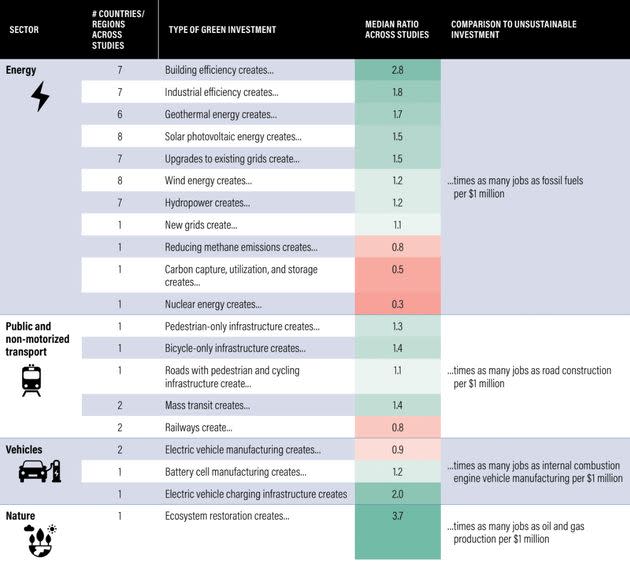Money For Green Energy Creates More Jobs Than Fossil Fuel Investment, New Study Finds

As Congress debates whether to pare down the Biden administration’s signature climate proposals or allow the fossil fuel industry to benefit more from new government programs, new research suggests doing so would create far fewer jobs.
For every million dollars the United States government invests, solar produces over 2.7 times more jobs than fossil fuels, according to an analysis from two environmental think tanks and a labor union. Wind energy spurs over 2.8 times more jobs than investments in oil, gas and coal. And retrofitting buildings to be more energy efficient creates demand for nearly three times as many jobs.
The findings appear to hold true across the world.
The paper ― which the World Resources Institute, New Climate Economy, and the International Trade Union Confederation published Monday ― reviewed a dozen studies from 2009 to 2020 and compared the projected job numbers in Brazil, China, Indonesia, Germany, South Africa, South Korea, the United States and globally.

Dollar for dollar, solar energy creates a global average of 1.5 times as many jobs as investing the same money into fossil fuels. Geothermal energy generates over 1.7 times as many jobs. Building efficiency retrofits spur 2.8 times more jobs.
Green jobs with even lower capital costs, such as paying workers to rehabilitate wetlands or plant trees, made for an even starker comparison with expensive fossil fuel production, creating nearly four times as many jobs.
Compared to building new roads, constructing mass transit systems created 1.4 times as many jobs globally, the paper found. (For the U.S., that figure fell slightly, to 1.2.)
“If you want economic stimulus, green investments are a better option,” said Joel Jaeger, a researcher at the World Resources Institute and the paper’s lead author. “Continuing to funnel money to unsustainable infrastructure rather than green infrastructure doesn’t make sense for the climate, but it also doesn’t make sense for workers. So there is a win-win opportunity here.”
Putting aside the obvious need to avert the trillions of dollars in damage climate change is projected to cause, the counterargument to going all-in on clean investments is that fossil fuel jobs still tend to pay slightly more in most countries. That, Jaeger said, is primarily due to the fact that unions have had decades more to bargain good contracts for workers mining coal or drilling oil and gas.
But a recent paper from Princeton University researchers concluded that paying clean-energy workers higher wages would increase their productivity enough to offset higher labor costs and maintain a steady pace of transitioning from fossil fuels to renewables. Requiring union labor or prevailing wages for projects that benefit from government spending would help make solar and wind jobs as well-paid as building pipelines or pumping oil.
The picture the new research paints is not all rosy for jobs in the automotive sector. Electric vehicles are, on the whole, expected to create more jobs across the economy as plug-in drivers increase demand for electricity, a sector that is more labor-intensive than oil production. But electric vehicles require fewer jobs in manufacturing and maintenance than internal combustion engine cars, meaning many of those workers would need to be retrained or reemployed elsewhere. (Jaeger said determining how best to do so is the subject of his next research project.)
One of the most important findings of the report is the very straightforward conclusion that a green economy is a more labor-intensive economy.Jason Walsh, executive director of the BlueGreen Alliance
Nor is the picture complete. The research largely overlooked nuclear power and carbon capture technology, two more controversial and costly ways to generate electricity without planet-heating pollution. The report does not look at all at technology to remove carbon dioxide emissions from the atmosphere, a nascent but necessary sector that could at full scale employ upward of 300,000 people in the U.S. alone, according to a 2020 study from the Rhodium Group consultancy.
Still, the findings “will absolutely resonate with the labor movement,” said Jason Walsh, executive director of the BlueGreen Alliance, a consortium of labor unions and environmental groups.
“One of the most important findings of the report is the very straightforward conclusion that a green economy is a more labor-intensive economy,” said Walsh, whose group was not involved in the research.
Policies to promote green investments are also already popular. Two-thirds of voters across party lines support federal investments into clean energy jobs, according to polls from the Democratic think tank Data for Progress.
“This new research further proves what folks in the climate movement have long argued: Investments in our climate and environment are indeed good for the economy,” said Marcela Mulholland, the political director at Data for Progress, which was not involved in the study. “At a time when polling shows that voters have increased concerns about jobs and climate, it’s really a no-brainer for the federal government to prioritize green investments to put our economy back on track. It’s good politics and good policy.”
This article originally appeared on HuffPost and has been updated.

 Yahoo Finance
Yahoo Finance 


